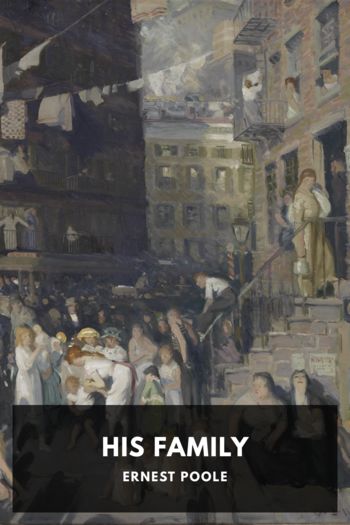His Family - Ernest Poole (ereader for comics .txt) 📗

- Author: Ernest Poole
Book online «His Family - Ernest Poole (ereader for comics .txt) 📗». Author Ernest Poole
And now here was Deborah fulfilling a part of him in herself. “You will live on in our children’s lives.” But this was going much too far! She was letting herself be swallowed up completely by this work of hers! It was all very well for the past ten years, but she was getting on in age! High time to marry and settle down!
Again angrily he shook off the thought of that boy Joe alone in a cell, eyes fixed in animal terror upon the steel door which would open so soon.
The day was slowly breaking. It was the early part of June. How fresh and lovely it must be up there in the big mountains with Edith’s happy little lads. Here it was raw and garish, weird. Some sparrows began quarreling just outside his window. Roger rose and walked the room. Restlessly he went into the hall. The old house appeared so strange in this light—as though stripped bare—there was something gone. Softly he came to Deborah’s door. It was open wide, for the night had been warm, and she lay awake upon her bed with her gaze fixed on the ceiling. She turned her head and saw him there. He came in and sat down by her window. For a long time neither made a sound. Then the great clock on the distant tower, which had been silent through the night, resumed its deep and measured boom. It struck six times. There was silence again. More and more taut grew his muscles, and suddenly it felt to him as though Deborah’s fierce agony were pounding into his very soul. The slow, slow minutes throbbed away. At last he rose and left her. There was a cold sweat on his brow.
“I’ll go down and make her some coffee,” he thought.
Down in the kitchen it was a relief to bang about hunting for the utensils. On picnics up in the mountains his coffee had been famous. He made some now and boiled some eggs, and they breakfasted in Deborah’s room. She seemed almost herself again. Later, while he was dressing, he saw her in the doorway. She was looking at her father with bright and grateful, affectionate eyes.
“Will you come to school with me today? I’d like you to see it,” Deborah said.
“Very well,” he answered gruffly.
XOut of the subway they emerged into a noisy tenement street. Roger had known such streets as this, but only in the nighttime, as picturesque and adventurous ways in an underground world he had explored in search of strange old glittering rings. It was different now. Gone were the Rembrandt shadows, the leaping flare of torches, the dark surging masses of weird uncouth humanity. Here in garish daylight were poverty and ugliness, here were heaps of refuse and heavy smells and clamor. It disgusted and repelled him, and he was tempted to turn back. But glancing at Deborah by his side he thought of the night she had been through. No, he decided, he would go on and see what she was up to here.
They turned into a narrower street between tall dirty tenements, and in a twinkling all was changed. For the street, as far as he could see, was gay with flaunting colors, torrents of bobbing hats and ribbons, frocks and blouses, shirts and breeches, vivid reds and yellows and blues. It was deafening with joyous cries, a shrill incessant chatter, chatter, piercing yells and shrieks of laughter. Children, swarms of children, children of all sizes passed him, clean and dirty, smiling, scowling, hurrying, running, pummeling, grabbing, whirling each other ’round and ’round—till the very air seemed quivering with wild spirits and new life!
He heard Deborah laughing. Five hilarious small boys had hold of her hands and were marching in triumph waving their caps. “Heigh there—heigh there! Heigh—heigh—heigh!”
The school was close in front of them. An enormous building of brick and tile wedged into a disordered mass of tenements, shops and factories, it had been built around a court shut out from the street by a high steel fence. They squeezed into the gateway, through which a shouting punching mob of urchins were now pushing in; and soon from a balcony above Roger looked down into the court, where out of a wild chaos order was appearing. Boys to the right and girls to the left were forming in long sinuous lines, and three thousand faces were turned toward the building. In front appeared the Stars and Stripes. Then suddenly he heard a crash from underneath the balcony, and looking down he saw a band made up of some thirty or forty boys. Their leader, a dark Italian lad, made a flourish, a pass with his baton, and the band broke into a blaring storm, an uproarious, booming march. The mob below fell into step, and line after line in single file the children marched into their school.
“Look up! Look all around you!” He heard Deborah’s eager voice in his ear. And as he looked up from the court below he gave a low cry of amazement. In hundreds of windows all around, of sweatshops, tenements, factories, on tier upon tier of fire escapes and even upon the roofs above, silent watchers had appeared. For this one moment in the day the whole congested neighborhood had stopped its feverish labor and become an amphitheater with all eyes upon the school. And the thought flashed into Roger’s mind: “Deborah’s big family!”
He had a strange confusing time. In her office, in a daze, he sat and heard his daughter with her two assistant principals, her clerk and her stenographer, plunge into the routine work of the day. What





Comments (0)